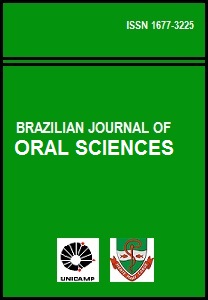Abstract
Aim: To compare the use of etoricoxib and dexamethasone for postoperative pain prevention and control after mucogingival surgery. Methods: Fifty-eight patients with indication for mucogingival surgery took part in this randomized parallel double-blind clinical trial. They were divided into three groups (G): G1 – placebo 1 h before surgery; G2 – 8 mg dexamethasone 1 h before surgery; G3 – 90 mg etoricoxib 1 h before surgery. Pain intensity was assessed in donor and recipient sites separately using the 101-point numerical rating scale NRS – 101, every hour for the first 8 h after surgery and three times a day on the following 3 days. Results: there was a statistically significant difference in the postoperative pain intensity in the donor site between G1 and G3 after 1 h, 2 h, 3 h, 7 h, 8 h and on the second day – in the evening after 32 h; between G1 and G2 after 2 h and 3 h, and between G2 and G3 only after the first hour. Pain intensity in the recipient site was statistically significant between G1 and G3 after 1 and 2 h (p<0.05). In addition, there was a lower ingestion of rescue medication in G2 and in G3 than in G1 (p=0.002). Conclusions: the use of a pre-emptive single dose of etoricoxib or dexamethasone may be considered an effective protocol for postoperative pain prevention and control after mucogingival surgery.
This work is licensed under a Creative Commons Attribution 4.0 International License.
Copyright (c) 2015 Ligia Nadal Zardo, Fábio André dos Santos, Gibson Luiz Pilatti
Downloads
Download data is not yet available.

